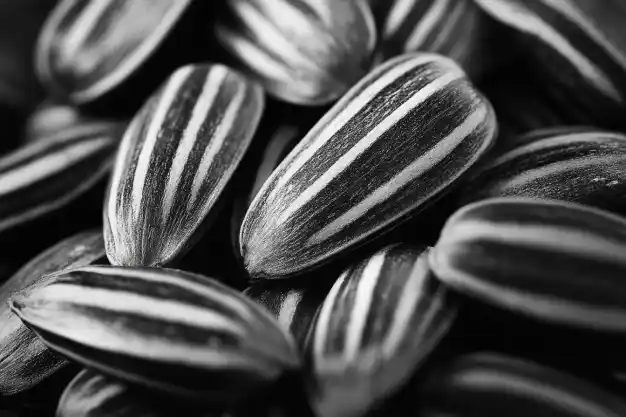Sunflower seeds are a powerhouse of nutrients, offering a rich source of vitamins, minerals, and healthy fats. Whether enjoyed as a snack, added to recipes, or ground into sunflower seed butter, these seeds bring both flavor and health benefits to the table. This Sunflower Seed Nutrition Guide explores their nutritional profile, health advantages, and ways to include them in your diet.
1. Understanding Sunflower Seeds
What Are Sunflower Seeds?
Sunflower seeds are the edible seeds of the sunflower plant (Helianthus annuus). Commonly consumed as a snack or ingredient, they are valued for their nutty flavor and nutritional density.
- Types of Sunflower Seeds:
- Hulled: Seeds with the shell removed, making them convenient for cooking and snacking.
- Unshelled: Whole seeds that need cracking, often enjoyed roasted and salted.
- Sprouted: Seeds that have been germinated, increasing their nutrient bioavailability.
For tips on growing your own sunflower seeds, visit Kamala’s Garden.

2. Sunflower Seed Nutrition Facts
Macronutrient Breakdown
- Carbs: Sunflower seeds are low in carbohydrates, with minimal impact on blood sugar levels, making them suitable for low-carb and keto diets.
- Fats: They are rich in healthy fats, particularly omega-6 fatty acids, which support brain function and hormone production.
- Protein: A single ounce of sunflower seeds provides 5–6 grams of protein, containing essential amino acids that promote muscle repair and overall health.
Vitamins and Minerals
Sunflower seeds are nutrient-dense, offering:
- Vitamin E: A powerful antioxidant that protects cells from oxidative damage.
- Selenium: Boosts antioxidant defenses and supports thyroid health.
- B-vitamins: Includes niacin, B6, and folate, essential for energy metabolism and brain function.
- Magnesium, Iron, and Zinc: Support bone health, oxygen transport, and immune system strength.
For a detailed breakdown of sunflower seed nutrients, check out Verywell Fit’s guide.
3. Health Benefits of Sunflower Seeds
Supports Healthy Digestion
The dietary fiber in sunflower seeds promotes gut health by aiding digestion and preventing constipation.
Heart Health
Sunflower seeds help lower cholesterol levels and support cardiovascular health through their content of healthy fats, magnesium, and phytosterols.
Anti-Inflammatory Properties
The Vitamin E and antioxidants in sunflower seeds combat inflammation, reducing the risk of chronic conditions such as arthritis and cardiovascular disease.
Aids in Weight Management
Their high satiety value makes sunflower seeds a great snack for curbing hunger, preventing overeating, and maintaining a healthy weight.
May Reduce Risk of Chronic Diseases
Consuming sunflower seeds may lower risks associated with diabetes and hypertension due to their magnesium and polyphenol content.
Cellular Health
The antioxidants in sunflower seeds help combat oxidative stress, protecting cells from damage and slowing the aging process.
4. Allergies and Potential Adverse Effects
Common Allergic Reactions
Some individuals may experience allergic reactions to sunflower seeds, including itching, swelling, or respiratory issues. If you suspect an allergy, consult a healthcare provider.
Potential Downsides
- Cadmium Content: Sunflower seeds can accumulate cadmium, a heavy metal. Consume in moderation to avoid excessive intake.
- Excessive Calories: While nutritious, sunflower seeds are calorie-dense, so portion control is key.
- Sodium Levels: Salted varieties may contribute to high sodium intake, impacting blood pressure.
5. Sunflower Seed Varieties
Hulled vs. Unhulled Seeds
- Hulled: Easier to use in recipes and snacks but more processed.
- Unhulled: Natural and wholesome, perfect for snacking with a satisfying crunch.
Raw vs. Roasted
- Raw: Retain the most nutrients but may have a milder flavor.
- Roasted: Enhance flavor but can lose some nutrients during the roasting process.
Sprouted Sunflower Seeds
Sprouting increases the nutrient bioavailability, making sprouted seeds an excellent choice for salads and raw dishes.

6. Storage and Food Safety
Proper Storage Tips
- Store sunflower seeds in airtight containers in a cool, dark place to prevent rancidity.
- Refrigeration extends freshness, especially for hulled or sprouted seeds.
Shelf Life
Sunflower seeds typically last:
- Raw: Up to a year if stored properly.
- Roasted: 6–9 months.
Discard seeds that develop an off smell or taste.
7. Ways to Eat Sunflower Seeds
As a Snack
Enjoy sunflower seeds roasted, salted, or flavored for a quick and healthy snack.
In Recipes
Add sunflower seeds to salads, baked goods, or smoothies for extra crunch and nutrition.
As a Butter or Spread
Sunflower seed butter is a great alternative to peanut or almond butter, offering a nut-free option that’s rich in nutrients.
FAQs About Sunflower Seeds
- Are Sunflower Seeds Keto-Friendly?
Yes, sunflower seeds are low in carbohydrates and suitable for a keto diet. They provide energy without spiking blood sugar, making them a great addition to any Sunflower Seed Nutrition Guide. - How Much Sunflower Seed Intake Is Safe Daily?
A serving of 1–2 ounces per day is considered safe for most individuals, as emphasized in this Sunflower Seed Nutrition Guide to ensure balanced nutrition. - Can Sunflower Seeds Help With Weight Loss?
Yes, their high fiber and protein content promote satiety, aiding portion control and calorie management. As outlined in this Sunflower Seed Nutrition Guide, they can be a smart choice for weight-conscious diets.
Related Articles
Explore these resources to enhance your diet and gardening knowledge:

